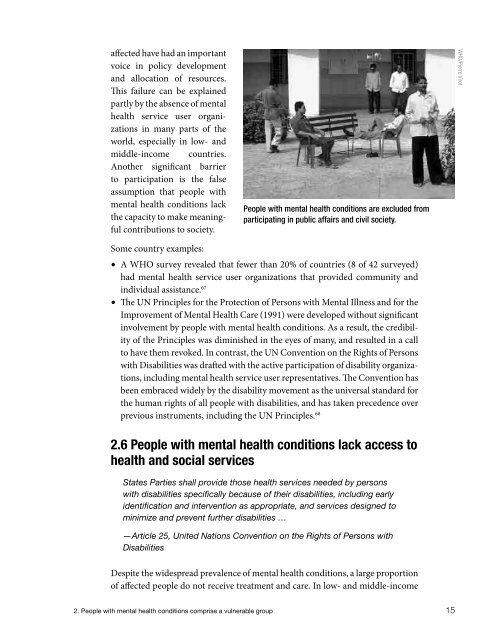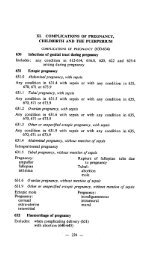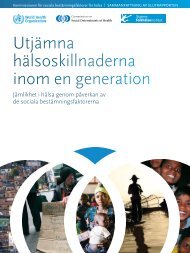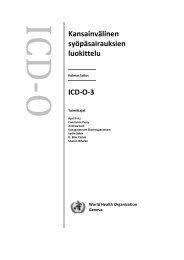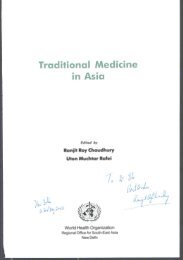MENTAL HEALTH AND DEVELOPMENT: - libdoc.who.int - World ...
MENTAL HEALTH AND DEVELOPMENT: - libdoc.who.int - World ...
MENTAL HEALTH AND DEVELOPMENT: - libdoc.who.int - World ...
You also want an ePaper? Increase the reach of your titles
YUMPU automatically turns print PDFs into web optimized ePapers that Google loves.
affected have had an important<br />
voice in policy development<br />
and allocation of resources.<br />
This failure can be explained<br />
partly by the absence of mental<br />
health service user organizations<br />
in many parts of the<br />
world, especially in low- and<br />
middle-income countries.<br />
Another significant barrier<br />
to participation is the false<br />
assumption that people with<br />
mental health conditions lack<br />
the capacity to make meaningful<br />
contributions to society.<br />
2.Peoplewithmentalhealthconditionscompriseavulnerablegroup<br />
People with mental health conditions are excluded from<br />
participating in public affairs and civil society.<br />
Some country examples:<br />
• A WHO survey revealed that fewer than 20% of countries (8 of 42 surveyed)<br />
had mental health service user organizations that provided community and<br />
individual assistance. 67<br />
• The UN Principles for the Protection of Persons with Mental Illness and for the<br />
Improvement of Mental Health Care (1991) were developed without significant<br />
involvement by people with mental health conditions. As a result, the credibility<br />
of the Principles was diminished in the eyes of many, and resulted in a call<br />
to have them revoked. In contrast, the UN Convention on the Rights of Persons<br />
with Disabilities was drafted with the active participation of disability organizations,<br />
including mental health service user representatives. The Convention has<br />
been embraced widely by the disability movement as the universal standard for<br />
the human rights of all people with disabilities, and has taken precedence over<br />
previous instruments, including the UN Principles. 68<br />
2.6 People with mental health conditions lack access to<br />
health and social services<br />
States Parties shall provide those health services needed by persons<br />
with disabilities specifically because of their disabilities, including early<br />
identification and <strong>int</strong>ervention as appropriate, and services designed to<br />
minimize and prevent further disabilities …<br />
—Article 25, United Nations Convention on the Rights of Persons with<br />
Disabilities<br />
Despite the widespread prevalence of mental health conditions, a large proportion<br />
of affected people do not receive treatment and care. In low- and middle-income<br />
15<br />
WHO/Pierre Virot


